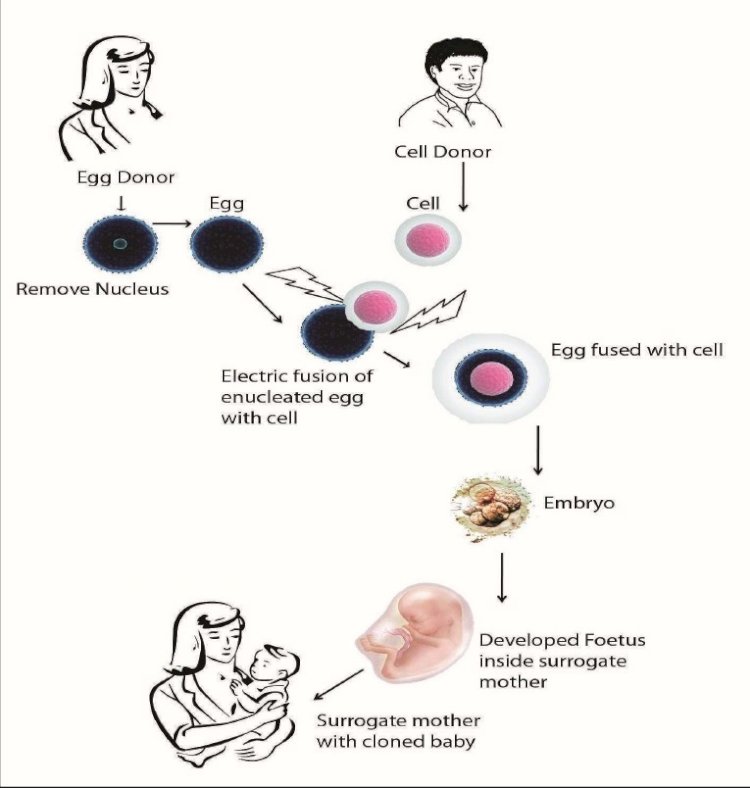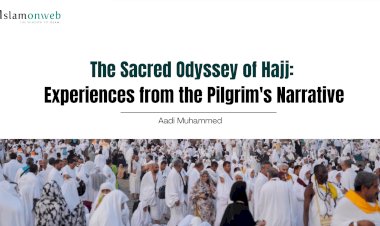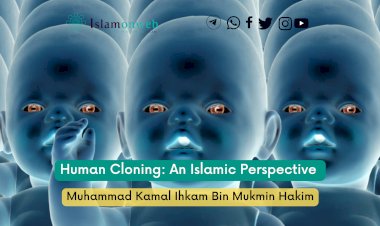Implications of Human Cloning in Islam: A Preliminary Examination of Potential Threats
Introduction
As humans continue to deepen in the field of scientific knowledge, new innovations and discoveries are made, which then demands for the Islamic ruling and jurists’ views. For example, genetic engineering utilises advanced laboratory apparatus to amend and modify the DNA structure of an organism. Another newly discovered innovation allows a female to reproduce a duplicate of herself without natural fertilisation. That being the case, human cloning, a recent scientific breakthrough, has ignited a heated debate within Muslim communities. Scholars from diverse backgrounds have clashed over the ethical and religious implications of this controversial technology. Acknowledging this controversy, this essay will examine the concept of human cloning from an Islamic perspective, exploring its implications through the framework of objectives of Sharia (maqāsid al-sharī‘ah).
The Meaning and Types of Human Cloning
Originating from the Greek word for “twig,” the term “clone” encompasses a group of identical entities. It refers to the production of genetically identical organisms or cell lines through asexual means. It involves creating an exact copy of another cell, tissue, or organism with the same genetic information. A prominent example of cloning was Dolly, which was the female Finn-Dorset sheep and the first mammal cloned from an adult somatic cell. According to the National Human Genome Research Institute, there are three different types of cloning as follows:
- Gene cloning, which creates copies of genes or segments of DNA.
- Reproductive cloning, which creates copies of whole animals.
- Therapeutic cloning, which creates embryonic stem cells. Researchers hope to use these cells to grow healthy tissue to replace injured or diseased tissues in the human body.
Whereas human cloning which typically refers to reproductive cloning, is defined as the deliberate production of genetically identical individuals. These clones have the same exact set of instructions (DNA) tucked away inside their cells, which means every cell in their body has the same genes, making them DNA twins. True clones even share the same genetic code in their "batteries" called mitochondria; however, the term clones is also used to refer to individuals who have identical nuclear DNA but have different mitochondrial DNA. Up to this date, there are two main methods commonly used for reproductive cloning:
- Cloning using somatic cell nuclear transfer (SCNT): It involves transferring the nucleus of a somatic cell (a cell from the body) into an enucleated egg cell (an egg cell with its nucleus removed). This fusion of cells results in an embryo that can be implanted into a surrogate mother, potentially leading to the birth of a cloned offspring. The resulting baby will be a genetic replica of the individual who donated the nucleus, inheriting all of its nuclear DNA from a single parent.
 Figure 1: Somatic cell nuclear transfer (SCNT) procedure
Figure 1: Somatic cell nuclear transfer (SCNT) procedure - Cloning by embryo splitting: Embryo splitting is also called artificial embryo twinning. This way of cloning mimics the way natural twins occur. This procedure begins with in vitro fertilization (IVF), where a sperm and an egg are united outside the female body to produce a zygote. The zygote (from here onwards also called an embryo) then undergoes cell division, forming two and then four identical cells. These identical cells are meticulously separated and allowed to develop further into individual embryos, each genetically identical to the original embryo and to each other.

Figure 2: Embryo splitting procedure
Juristic Views on Human Cloning
Islam, through its philosophy of objectives of Sharia (maqāsid al-sharī‘ah), provides a comprehensive framework for Islamic ethics in science and technology. This framework revolves around five overarching objectives: preserving religion (dīn), life (nafs), offspring (nasl), intellect (‘aql), and wealth (māl), which serves as a practical and holistic checklist to decide its permissibility in Islam in ijtihad-related matters, along with other principles of fiqh. If any one of the five are threatened, the issues would be forbidden serving as a practical guide for evaluating the permissibility of scientific endeavours. If any of these objectives are compromised, the research, processes, products, or outcomes are considered impermissible.
Human cloning, while seemingly aligned with the objectives of Sharia (maqāsid al-sharī‘ah) of preserving life and lineage, its potential benefits and purposes pale in comparison to the detrimental consequences. Therefore, the debate surrounding the cloning process in general and human cloning continues among Muslim scholars, with varying opinions ranging from absolute prohibition to conditional permission.
In 1997, a significant event shaped the discussion around human cloning in Islamic contexts. A symposium in Casablanca, Morocco, brought together representatives from various Islamic organisations, including legal experts, medical professionals, and scholars, to examine the ethical implications of this emerging technology. This gathering resulted in a proposal presented to the Islamic Fiqh Academy Council, ultimately leading to the declaration of human reproductive cloning as prohibited under Islamic law.
One key argument against human reproductive cloning stems from Quranic verses 118 and 119 from Surah An-Nisa’: “(Satan) cursed by Allah who said, I will surely take hold of a certain number of Your servants. I will certainly mislead them and delude them with empty hopes. Also, I will order them and they will slit the ears of cattle and alter Allah’s creation.” Some interpreted these verses as a general condemnation of interfering with God's creation, encompassing the potential of cloning to manipulate human procreation. This position emphasises respect for the divine order and preserving the natural course of human existence.
However, not all scholars agree with this interpretation. Some argued that human cloning can be seen as a scientific exploration within the scope of God's creation, highlighting its potential to address infertility and advance medical knowledge. They draw parallels with existing assisted reproductive technologies like insemination.
The interpretation of the specific verse "فَلَيُغَيِّرُنَّ خَلْقَ ٱللَّهِ" (to alter Allah's creation) in Surah An-Nisa’ verse 119 adds further nuance to the debate. Some scholars suggested that its meaning pertains to altering divinely ordained principles rather than solely physical manipulation. This underscores the ethical and spiritual dimensions beyond the biological act of cloning. Then, the debate extends beyond interpretations of specific verses, engaging with the concept of "Fitrah" (natural order) established by God for humankind. Verses like in Surah Ar-Rum verse 30 “The natural Way of Allah which He has instilled in all people. Let there be no change in this creation of Allah”, emphasizing the importance of respecting the inherent diversity and complexity of human existence.
Beyond purely religious considerations, several ethical and societal concerns raise questions about the permissibility of human reproductive cloning. One key concern relates to individual autonomy and diversity. The Quran celebrates the unique tapestry of humanity, as evidenced by verses like: “And one of His signs is the creation of the heavens and the earth, and the diversity of your languages and colours”. Human reproductive cloning, with its potential to create genetically identical individuals, could jeopardise this inherent diversity and raise concerns about reducing individuals to mere copies.
Another area of concern involves the potential impact on the family unit. Advancements in genetic engineering associated with cloning could challenge traditional family structures and introduce complexities in areas like inheritance, kinship, and family dynamics. This potential disruption necessitates careful consideration of the social and emotional implications of such technology.
Furthermore, the potential for misuse by authoritarian regimes poses a significant ethical concern. The ability to replicate individuals could be exploited for controlling populations, suppressing dissent, or jeopardising global security. These potential risks highlight the importance of responsible governance and international collaboration to ensure the safe and ethical development of this technology.
To summarise, the opposition to human reproductive cloning in Islamic law reaches beyond purely religious arguments. It embraces a wider range of ethical and societal concerns, including respecting the natural order of life, protecting individual autonomy from manipulation, and safeguarding against potential misuse. These concerns extend to the very foundation of Islamic law, represented by the objectives of Sharia (maqāsid al-sharī‘ah), which upholds the protection of faith, lineage, intellect, and property. By undermining these core principles, human reproductive cloning goes beyond mere contradiction of Sharia principles, eventually eroding the very foundations of Islamic law.
Conclusion
In summary, even though there are some views that support the permissibility of human cloning, the view that it is forbidden (haram) in Islam is superior (rajih). Human cloning goes against human nature (fitrah) and brings upon a high level of risks and consequences on many aspects of human life, especially socially and religiously. In the near future, further new technologies and advancements will emerge which makes the need for juristic explanation and rulings a constant vital need for Muslims. Wallahu a’lam bissawab.
[As part of Synergised Academic and Student Activities, this article was prepared for the course RKFQ 4141A, Qadaya Fiqhiyyah Mu’asirah: Contemporary Juristic Issues at AHAS KIRKHS, IIUM (Sem 1, 2023-2024]
References
Mansor, Muhammad Mahyuddin. (2023, June 7). Why is Human Cloning Prohibited: A Maqāṣid Sharīʿah and SDG Perspective. Islamonweb English. https://en.islamonweb.net/why-is-human-cloning-prohibited-a-maqa%E1%B9%A3id-shari%CA%BFah-and-sdg-perspective
Dow, K. (2019). Looking into the Test Tube: The Birth of IVF on British Television. Medical History, 63(2), 189–208. https://doi.org/10.1017/mdh.2019.6
Dr Abu Bakar Abdul Majeed. (1998, January 17). HUMAN CLONING – IS MAN PLAYING GOD? Laman Web Rasmi: Institut Kefahaman Islam Malaysia (IKIM). https://www.ikim.gov.my/index.php/1998/01/17/human-cloning-is-man-playing-god
en-asks. (2022, August 26). Cloning and Its Impacts - Fiqh. IslamOnline. https://fiqh.islamonline.net/en/cloning-and-its-impacts/
Executive Board. (2004). WORLD HEALTH ORGANIZATION EXECUTIVE BOARD EB115/INF.DOC./2 115th Session Reproductive cloning of human beings: status of the debate in the United Nations General Assembly Report by the Secretariat. https://apps.who.int/gb/archive/pdf_files/EB115/B115_ID2-en.pdf
IslamWeb. (2003, May 8). الحكم الجلية من تحريم الاستنساخ. Www.islamweb.net. https://www.islamweb.net/ar/fatwa/31734/?searchKey=1MndAxJgNN2ESumg9beK&
Medical Advisory Secretariat. (2006). In vitro fertilization and multiple pregnancies: an evidence-based analysis. Ontario Health Technology Assessment Series, 6(18), 1–63. https://www.ncbi.nlm.nih.gov/pmc/articles/PMC3379537/#A01fm01title
Muhammad Kamal Ihkam Bin Mukmin Hakim. (2023, June 20). Human Cloning: An Islamic Perspective. Islamonweb English. https://en.islamonweb.net/human-cloning-an-islamic-perspective#_edn2
Muhsin, S.M., Arab, S.Z. & Chin, A.H.B. Islamic Viewpoints on Opportunistic Sex Selection of IVF Embryos upon doing Preimplantation Genetic Testing for Preventing Genetic Diseases. ABR (2023). https://doi.org/10.1007/s41649-023-00258-1
Nasr-Esfahani, M. H., Ahmad-Khanbeigi, K., & Hasannia, A. (2021). Qur’anic Views on Human Cloning (I): Doctrinal and Theological Evidences. International Journal of Fertility & Sterility, 15(1), 73–79. https://doi.org/10.22074/IJFS.2020.134415
National Research Council. (2002). Scientific and Medical Aspects of Human Reproductive Cloning. National Academies Press. https://doi.org/10.17226/10285
Syahnan, M., & Daulay, S. P. (2005). Human cloning in islam (An ethical and juriprudential analysis). Indo-Islamika: Journal of Islamic Science, 2(2), 323–337. http://repository.uinsu.ac.id/2041
WEI, C. L. (2013). Islamic ethical framework to tackle scientific and technological dilemmas. Journal of Dharma, 38(4), 373-386.
Tls, D. (n.d.). Cloning in view of Sharia Islam Biotechnology. Www.academia.edu. Retrieved November 17, 2023, from https://www.academia.edu/9994533/Cloning_in_view_of_Sharia_Islam_Biotechnology
About the authors
Siti Anissa Abdul Rashid and Maryam Atiqah Abdul Fatah are pursuing their Bachelor's degree in Islamic Revealed Knowledge and Heritage (Fiqh and Usul al-Fiqh) at AHAS, KIRKHS, in the International Islamic University Malaysia
Disclaimer
The views expressed in this article are the author’s own and do not necessarily mirror Islamonweb’s editorial stance.
























Leave A Comment